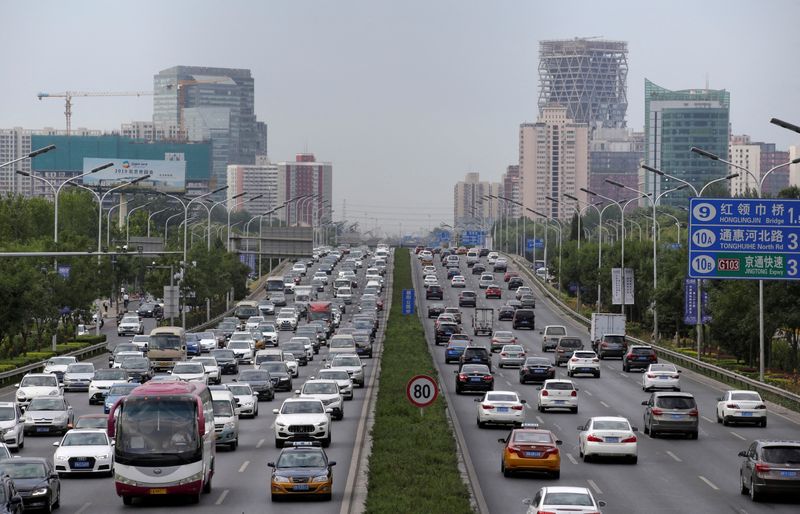By Qiaoyi Li, Ziyi Tang and Brenda Goh
BEIJING (Reuters) - China's efforts to boost auto sales by cutting downpayments on car loans stand to be frustrated by a price war and consumer caution, chiefly benefiting a few brands favoured by younger buyers, such as Tesla (NASDAQ:TSLA) and Nio (NYSE:NIO), analysts said.
Authorities pitching the move as a way to boost the economy said this week they would set car loan terms and quotas "reasonably", but stopped short of revealing the new levels.
The revision is likely to be the first in rules for management of car loans since 2017, few industry officials and analysts saw it as a gamechanger, however.
"It won't move the needle much," said Christopher Beddor, deputy director of China research at Gavekal Dragonomics.
"Household auto demand is likely to slow this year, and tweaking minimum downpayments for purchases isn't likely to change that."
Some firms are already offering zero downpayments for car leasing deals in a price war that has drawn in more than 40 brands since last year.
Chinese consumers are also reluctant, in general, to take on new loans, besieged by worries about job security and weak income growth that have weighed on the broader economy, the analysts said.
"The bottom line is that the policies they're using to stimulate consumption simply don't cut it, and there doesn't seem to be a political appetite for stronger measures," Beddor said.
"So we will need to see faster household income growth in order to get a meaningful acceleration in consumption."
China's central bank and financial regulators did not immediately respond to facsimile questions seeking comment on when the cuts would be announced.
SLIPPING SALES
Sales in the world’s largest auto market have slipped into single digit or even negative growth in recent years, down from the last high of 15.9%, in 2016.
Sales of new energy vehicles (NEV), viewed as a bright spot, have also started slowing sharply, to an annual gain of 36.2% in 2023 from 90% in 2022.
The price war began last year, after China ended a 13-year subsidy scheme for NEV purchases in 2022.
New brands entered the market and EV makers such as Tesla and BYD (SZ:002594) leveraged falling production costs to take market share from automakers focused on internal combustion engine cars.
China unveiled a $72-billion package of tax breaks over four years for electric EVs and other green cars as it tried to boost auto sales last year, without returning to subsidies.
Current rules set a minimum downpayment of 15% for NEVs, 20% for internal combustion vehicles and 30% for used cars.
But some auto financial leasing firms are offering plans for buyers to drive off in a new car without putting down any cash.
Such plans, different from car loans, typically involve automakers as a third party, to enable consumers to rent a car from financial leasing firms and pay rent in instalments, with the car owned by the leasing firm until the rent is paid off.
Tesla's website, for instance, offers a five-year leasing plan with 0% down payment for the rear-wheel drive version of its Model 3 sedan being sold for 245,900 yuan ($34,000).
That cost is just 2.3% more than a buyer would pay with a car loan offer of 15% down payment and a term of 60 months, Reuters calculations show.
Still, the rule changes could draw in some buyers still on the sidelines, said Cui Dongshu, secretary general of the China Passenger Car Association.
"The lower requirements would be a big boost to young people who normally have insufficient savings," he said, particularly those hankering for cars with internal combustion engines that are subject to a purchase tax of 10% of the sticker price.
Sales of both new and used cars could benefit from the changes, said Daniel Zhou of Zhongsheng Group, China's largest dealer group by revenue.

The firm has seen a growing trend of both higher penetration ratio of auto financing and financing amounts in the past couple of years industrywide, added Zhou, its chief strategy officer.
($1=7.1927 Chinese yuan)